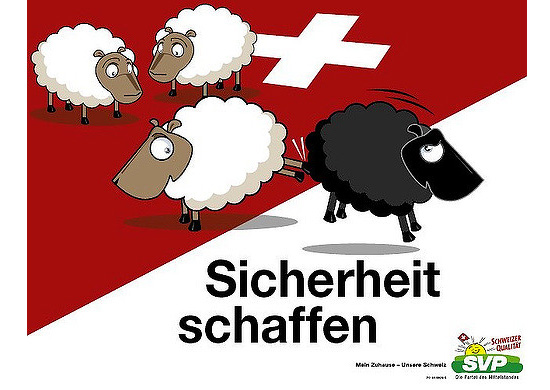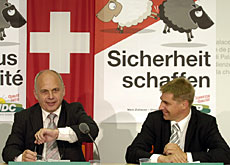The advertising guru harnessing Europe’s immigration fears

Swarms of black minarets bristle like missiles over a Swiss flag, next to a woman in a black burka. Black sheep, black ravens and black and brown hands grab Swiss passports.
This is the visceral world of Alexander Segert, the advertising guru of Europe’s new right.
It is a world of controversial images that provoke howls of outrage from across the political spectrum. One campaign, which depicted leftwingers as red rats stealing coins from a distraught-looking animated purse, was likened to Nazi propaganda.
In a rare interview in Zurich, Mr Segert dismisses the comparison. “When your opponent hasn’t any good arguments, they always wheel out the accusation of fascism,” he says. “It just shows how helpless they are.”
Head of the Swiss ad agency, Goal AG, Mr Segert has for years designed campaigns for the ultra-conservative Swiss People’s Party (SVP), as well as the rightwing populist Austrian Freedom Party (FPÖ). Now he’s branching out, selling his provocative brand of political PR in a much bigger market – Germany.

More
Financial Times
External linkHe is doing so at a pivotal moment in modern German history, with Angela Merkel facing an unprecedented challenge from the upstart, anti-immigration Alternative for Germany as she seeks a fourth term as chancellor in elections next year.
The AfD’s popularity has soared on the back of growing public disenchantment with Ms Merkel’s open-door refugee policy. Mr Segert is convinced that immigration will play as big a role in the German elections as it did in campaigning for the Brexit referendum and the US presidential race.
“Merkel opened the floodgates,” he says. “And now it’s the dominant theme.”
Mr Segert’s iconography once inhabited a world on the fringes of political debate and earned him the widespread opprobrium of peers. “He’s like those propagandists of the Third Reich who tried to demonise Jews,” says Pius Walker, founder of Walker Agency, another Swiss ad firm.
Yet over the past couple of years his visual language has become mainstream as populist politicians across the western world tap into voters’ concerns about open borders, population movements and the perceived rise of Islam. “This is now a major preoccupation, and political communication has to address it,” Mr Segert says.
Black and white sheep
He first came to prominence in 2009 with the poster he designed for the Swiss referendum on banning mosque minarets. Another poster he came up with a year later for a plebiscite on whether foreigners convicted of serious crimes should be deported showed a fluffy white sheep kicking a black sheep off the Swiss national flag.
“You may not agree with them, but the messages clearly have an impact,” says Mr Walker.
It was such an iconic image that rightwing groups across Europe – including the neo-Nazi NPD in Germany – stole it for their own campaigns. Mr Segert has tried to sue for copyright infringement, without success, but he is also flattered. “The fact we were plagiarised shows the campaign worked,” he says.
Soft-spoken and slightly bookish, Mr Segert, who has two adopted children from north Africa, does not seem like a rabble-rouser.
KISS approach
Indeed, he describes his work as an intellectual challenge. “I call it cracking nuts,” he says, “reducing complex messages so they have an effect and suddenly become a topic that people discuss.” His motto is KISS – “Keep it simple, stupid”.
Critics accuse him of irresponsibly stirring up voters’ anxieties, for example about foreign criminals (one campaign featured “Ivan S – rapist”, “Faruk B – murderer” and Ismir K – benefits cheat” – with the caption: “Soon to be Swiss?”). “The driving force of his posters is to provoke fear,” says Mr Walker.
Mr Segert rejects that argument. “We can’t manufacture these fears – they are already there,” he says.
Born and raised in Hamburg, he moved to Switzerland because the EU, with its “striving towards centralism”, was coming to resemble the Soviet Union, he says. “They are trying to bring different mentalities and cultures under one roof and level them. And people don’t like that.”
Contrarian
His politics were originally leftwing but he later worked as a journalist for the conservative Schweizerzeit and the SVP newspaper, the Zürcher Bote. He is, he says, a contrarian: “I’ve never been one for just going with the flow.”
He later joined Goal AG and over time became its manager and owner. The company has 13 staff and about 40 clients, both political and corporate.
Occasionally he, rather than his posters, has become the story. In Austria he was charged with incitement over a computer game he designed for the FPÖ that invited users to target mosques, minarets and muezzins as they appeared on a screen. He was acquitted in 2011. That same year his SUV was set on fire outside his house. An extreme leftwing group claimed responsibility.
Mr Segert has already made his presence felt in Germany. During German regional elections this year, free newspapers designed by Goal AG were stuffed in letterboxes across the country. Filled with negative stories and crude cartoons about refugees, the papers had a simple message: vote AfD.
The party denied any connection to the newspapers. Mr Segert declines to comment on Goal AG’s role in the affair , and on whether he would ever work for the AfD .
Some have suggested the images in his posters undermine democracy. He says they foster it by provoking debate.
“The most controversial campaigns we did for the SVP led to much higher voter turnout,” he says. “It’s much better that people get all red in the face and then go and vote than if they stay calm and stay at home.”
Copyright The Financial Times Limited 2016

In compliance with the JTI standards
More: SWI swissinfo.ch certified by the Journalism Trust Initiative












You can find an overview of ongoing debates with our journalists here . Please join us!
If you want to start a conversation about a topic raised in this article or want to report factual errors, email us at english@swissinfo.ch.